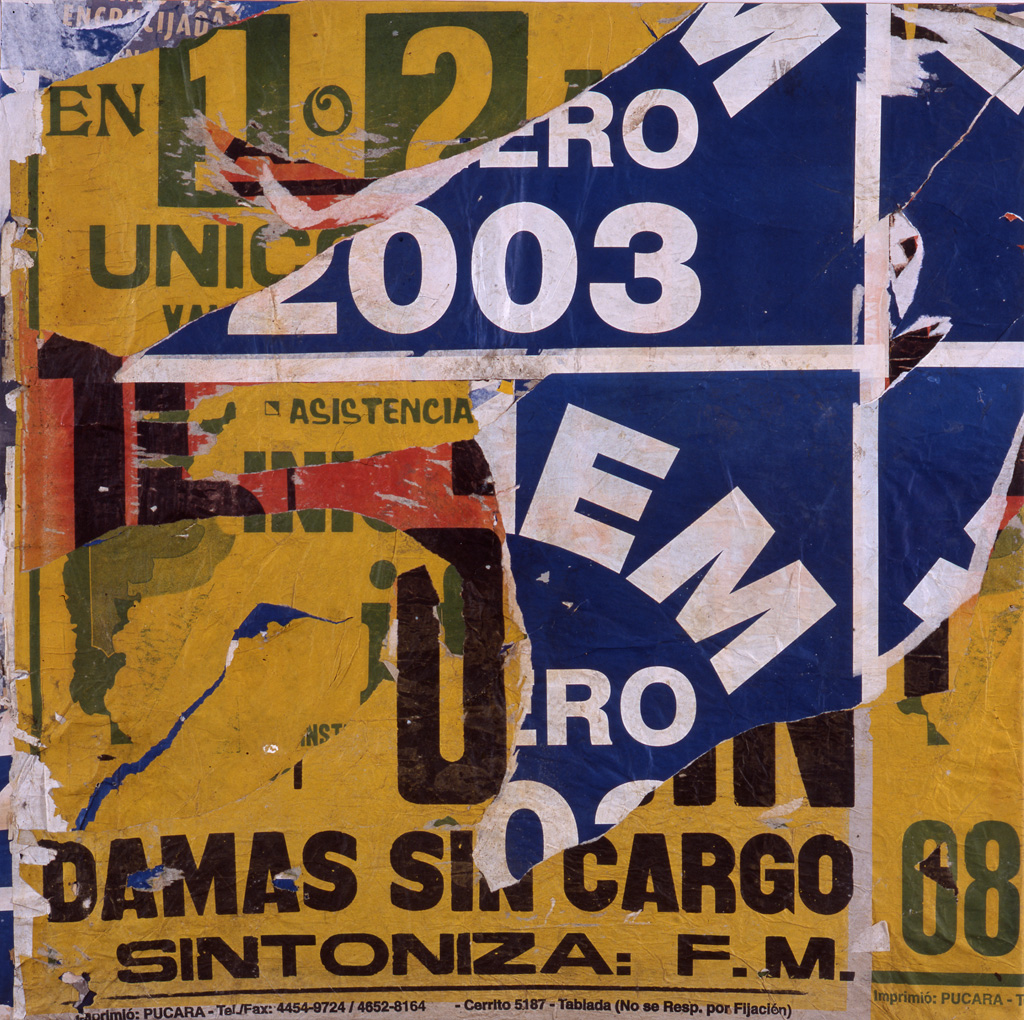

Torn posters mounted on canvas, 25,5 x 21,2 in.

Torn posters mounted on canvas, 42,1 x 57,4 in.

Torn posters mounted on canvas, 21,7 x 20,7 in.

Torn posters mounted on canvas, 32,6 x 33,0 in.

Torn posters mounted on canvas, 8,6 x 13,7 in.

Torn posters mounted on canvas, 44,8 x 63,7 in.

Torn posters mounted on canvas, 53,5 x 48,0 in.

Torn posters mounted on canvas, 63,75 x 44,9 in.

Torn posters mounted on canvas, 63,7 x 51,1 in.

Torn posters mounted on canvas, 47,2 x 47,2 in.
The gallery Cortex Athletico is pleased to present in collaboration with the gallery Georges-Philippe & Nathalie Vallois, a selection of works by French artist Jacques Villeglé from the 1970's to the 2000's.
"[...] Villeglé takes every opportunity to remind us that "everyone works for me". His finished pictures are home to the voices of the anonymous crowd in the street, of graphic designers and printers, of advertisers, industrialists, of poster-stickers, of passers-by who tear away or deface the printed surface. All these voices, from the humblest to the most mighty, come together and merge in the final picture.
Villeglé's torn posters have generally been read uniquely through the prism of Nouveau Réalisme, as an appropriation or urban nature, a coup that is defined historically in relation to Pop Art or the dead end in which painting found itself at the time. But, looking beyond these orderly episodes of art history, Villeglé readily admits to a longstanding, if unstated ambition to produce a body of work that would be to his day and age what Balzac's Comédie humaine was to his: a total novel, a kind of "competitor to the registry of births and deaths", the exhaustive and living expression of an age by artistic means ; what the artist himself calls a "Comédie urbaine". And indeed, in Villeglé's work we find all the values, all the social strata and all the movements of his times: the forms, the images, the words, the typographies, the ideologies, the actions, the technologies, the legal system : it's all there. Using ephemeral material - the public poster, and an act of urban poaching, or wildcat collecting (or, to borrow Bernard Lamarche-Vadel's expression, "creative apathy"), Villeglé reinvents history painting, just as Balzac managed to transform the quotidian adventures of his day into a cycle of novels. Has anyone represented France after the Second World War more effectively than Jacques Villeglé ? Who else has pursued such an ambition and created such a rich polyphony that is at once archaeological and aesthetic, artistic and documentary ? This "hypermnesic ensemble" the author's own definition (1), functions as a narrative that is in essence democratic. As Villeglé points out, "The political impact of the poster is manifested by the tear. The action of the anonymous tearer [lacérateur anonyme] intervenes in between the monolithic meaning intended by the designer of the slogan and the -beholder- that is yourself. Aesthetics, pluralism, irony and wildness are superimposed over the barbarism of the slogan."(2) A leap outside utilitarianism, a refusal of manipulation : in Villeglé's "urban comedy" the anonymous passer-by has the final say, not the state apparatus. And it is here, beyond the iconographical materials that he collects and the anecdotes that he passes on, that we find the political nub of his work.
[...]
Villeglé's whole oeuvre lays out a kind of topography: his pieces bear the names of the streets where the materials were sampled, along with the date. In this respect, his work could be seen as closer than is immediately apparent to that of Brouwn, Kawara or Huebler, insofar as what all their works basically do is report the movements of their author and map out towns. Familiar as he was with the Bohemian life of postwar Paris, a habitué of the Left Bank cafés where Guy Debord and the Lettristes learnt to live art rather than to produce it, Villeglé's existence and art-making have always been nomadic. He moves through and measures the urban territory in order to poach forms. "The painter is a prisoner of his studio, whereas I am mobile. My investigative gaze needs to remain fully receptive."(3)
[?] Villeglé observes, analyses and then classifies. He never produces a discourse from the position of the master, but stands beside us, being himself the beholder of work that is elaborated amidst the chaos through which we move without now giving it even a thought. This flâneur is the co-author of a body of work in relation to which his role seems to be that of the person who simply accompanies, like a psychoanalyst listening carefully to the discourse of the city and punctuating it with short samples, surrounding this or that revelatory figure, comparing recurrences, but taking the incredible mass of signs brought into existence exactly as they are. His position in relation to creating, to his environment and to the work of others in itself constitutes a political manifesto.
Nicolas Bourriaud
Extract from from « Villeglé politique », in the catalogue « Politiques 1957-2005»,
édition galerie Georges-Philippe & Nathalie Vallois, Paris, 2005
(1) J. Villeglé : "Carrefour politique", éd. Vers les Arts, 1997, p.16
(2) J. Villeglé : idem, p. 75.
(3) In : Bernard Lamarche-Vadel, "Villeglé. La présentation en jugement", éd. Marval, 1990, p. 71